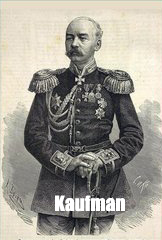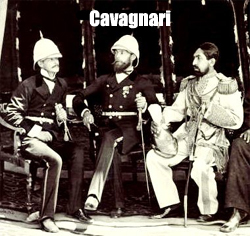|
The Second
Anglo-Afghan War. |
| Paragraph
1) Everything has to have a beginning and like in many other conflicts the spark which eventually led to the Second Anglo-Afghan War occurred far away from the territory of either protagonist. It began in a small remote village in Herzegovina. A rebellion broke out there in 1875 and soon the Balkans were ablaze with revolt. Paragraph 2) The initial revolt was caused by the rapacity and greed of local landlords, who were mostly Christian, but Herzegovina was a province of the Ottoman Turkish Empire and as unrest spread it rapidly became a movement seeking the end of Turkish rule. Within a year Bosnia, Serbia, Montenegro and Bulgaria were affected by anti-Turkish rebellions and the Turkish response was, as always, savage. In May of 1876, bashi-bazouks, fierce Turkish irregular troops, massacred between ten and fifteen thousand Christians in Bulgaria and a storm of protest swept all Europe. Paragraph 3)  For the British government of Prime Minister Disraeli, this was an extreme embarrassment. A central part of Disraeli's foreign policy was the need to maintain the integrity of the Ottoman Empire as a bulwark against Russian expansion in the eastern Mediterranean and Asia Minor. Sitting astride the overland route from Europe to India, it was essential to Britain that the Ottoman Empire not collapse. Should such a collapse occur the Russians would rush in to fill the resulting vacuum and their ability to threaten British interests would be immeasurably enhanced. Disraeli dismissed the first reports of Turkish massacres in the Balkans as 'coffee-house rumours'. Paragraph 4) There was no such embarrassment in St. Petersburg. For two centuries the Russians had dreamed of hoisting their flag over Constantinople and replacing the decaying Ottoman Empire with their own. So constant and single-minded was this desire that some have suggested the initial uprisings in the Balkans in 1875 were not spontaneous but the result of Russian machinations. This has never been satisfactorily proved. What is certain is that Tsar Alexander welcomed the chance for the Russians to again take up their self-appointed role as 'protectors' of Balkan Christianity and, riding a wave of popular fury at Turkish barbarism, sent his armies south into Bulgaria in the spring of 1877. Paragraph 5) Everyone in Europe expected a swift Russian victory for her armies were larger, better trained and equipped and marched with the zeal of liberators. They were rudely surprised at the siege of Plevna, in Bulgaria, where a determined Turkish army held out against a combined Russo-Rumanian force. Five months and 40,000 Russian and Rumanian lives later, the defences of Plevna were breached and the town fell. The Russian armies pushed south and Turkish resistance rapidly fell away. In the late winter of 1877 the Tsar's troops halted a mere two days march from Constantinople and as the Russian advance guard looked down into the waters of the Dardenelles, they saw to their horror, the masts of the Royal Navy's Mediterranean Fleet. It had been sent by Disraeli to protect the capital of the Ottoman Sultan, and therefore British interests in the Levant. The message was stark and simple, "Go no further, or risk war with Great Britain." Paragraph 6) The Russians, having been beaten by the British just over twenty years before in the Crimean War, climbed down and brought the fighting with Turkey to an end. They had, however, in the discussions which ended the war, secured large parts of Eastern Anatolia for themselves and forced the Turks to recognize the independence of Bulgaria. This was unacceptable to Britain who feared that an independent Bulgaria would become, in effect, a Russian satellite and provide the Tsar's armies with a direct land route to the Mediterranean and the ability to menace Britain's communications with India. The British government moved troops from India to Malta and with the support of Austria-Hungary (who had her own reasons for opposing Russian influence in the Balkans) prepared for a war to force Russian withdrawal. War was only averted by the calling of a great congress that was held in Berlin in 1878 under the supervision of the German Chancellor, Otto von Bismarck. The Congress of Berlin swiftly revised the treaty Russian power had earlier imposed on the Turks and everyone seemed to be happy with the new revisions - everyone but the Russians. Most of the territory the Turks had lost was returned to them, Austria-Hungary was given control of Bosnia-Herzegovina and Britain awarded Cyprus. Russia made limited territorial gains. The Russians, understandably, felt cheated. Paragraph 7) A thousand miles to the east of Constantinople General Kaufman, the Russian military governor of Turkestan, had found both his anglophobia and ambition stimulated by the events in the Balkans. As the war against Turkey proceeded, Kaufman had foreseen the possibility of British intervention and had begun to gather his forces. He  assembled an army
of over 30,000 men, the largest force ever assembled by the Russians in
Central Asia, and planned to lead it in
an invasion of British India as soon as war broke out between Russia
and Britain. His planned invasion route was to advance into
Afghanistan, march to Kabul and then over the Khyber Pass into the valley of the Indus and the
fertile plains of the Punjab. In order to facilitate
the passage of his troops through Afghanistan a military mission
commanded by Major-General Nikolai Stolietov was to proceed to Kabul
and, if not induce the Amir of Afghanistan into signing a treaty, at
least get his co-operation in the Russian
attack on India. assembled an army
of over 30,000 men, the largest force ever assembled by the Russians in
Central Asia, and planned to lead it in
an invasion of British India as soon as war broke out between Russia
and Britain. His planned invasion route was to advance into
Afghanistan, march to Kabul and then over the Khyber Pass into the valley of the Indus and the
fertile plains of the Punjab. In order to facilitate
the passage of his troops through Afghanistan a military mission
commanded by Major-General Nikolai Stolietov was to proceed to Kabul
and, if not induce the Amir of Afghanistan into signing a treaty, at
least get his co-operation in the Russian
attack on India.Paragraph 8) With the end of the Russo-Turkish War, Kaufman's planned invasion was cancelled but, even as the Congress of Berlin was debating the future of the Balkans, he allowed Stolietov's mission to go ahead anyway. Why he did this is uncertain. Perhaps he felt such a venture would provide information that might prove useful in the future. More likely he simply wished to irritate the British, who had just shown once again their ability to thwart Russian ambitions. Whatever the reason, Stolietov and his staff set off with an escort of 250 cossack cavalrymen and after an uneventful journey reached Kabul, capital of Sher Ali, the Amir of Afghanistan. The Afghans later claimed to have tried to halt Stolietov at the border, but had been threatened with dire consequences if they refused him permission to enter. Sher Ali's favourite son had just died, another unfavoured son, Yakub Khan, was under house arrest in Kabul and a nephew, Abdur Rahman, was living under Russian protection in Turkestan. The Amir was bluntly told that if he refused to accede to Russian demands, they would actively support Abdur Rahman's claim to the throne. Stolietov stayed in Kabul until August, concluded his business and then returned to Taskhent, leaving behind a promise that 30,000 Russian troops would come to the Amir's aid if he experienced 'difficulties' with the British.  Paragraph 9) The British were not amused. All their nightmares of Russian hordes pouring through the Khyber Pass and into India seemed to be coming true. To counter this new Russian influence in Kabul and secure India's vulnerable north-west frontier, the Viceroy of India, Lord Lytton, decided to send a similar British mission to Kabul and undo the supposed mischief of Stolietov. Major Louis Cavagnari was chosen to lead the mission and escorted by 250 troopers of the Corps of Guides set out for the Afghan border post of Torkham. Cavagnari was refused permission to enter Afghanistan and this rebuff confirmed the British in their belief that the Russians were intent on controlling Kabul as a prelude to an invasion of India. An ultimatum was sent to Sher Ali. It was ignored and in November three columns of British troops invaded Afghanistan; for the second time in 40 years. 1)What
is the main idea
of
paragraph 1? 2) What does the word 'either' in
sentence 1 of paragraph 1
refer to? 3) What does the word 'there' in
sentence 3 of paragraph 1
refer to? 4) Choose the meaning closest to
'ablaze' in paragraph 2. 5) What is the main idea of
paragraph 2? 6)What does the word 'it' in
sentence 1 of paragraph 2 refer
to? 7)Choose the meaning closest to
'savage' in paragraph 2. 8)Paragraph 2 is an example of
what kind of pattern? 9)Choose the meaning closest to
'irregular' in paragraph 2. 10)What does the word 'this' in
sentence 1 of paragraph 3
refer to? 11)Choose the meaning closest to
'bulwark' in paragraph 3. 12)Choose the meaning closest to
'astride' in paragraph 3. 13)What does the word 'it' in
sentence 3 of paragraph 3 refer
to? 14)What does the word 'their' in
sentence 4 of paragraph 3
refer to? 15)What is the main idea of
paragraph 4? 16)What does the word 'this' in
sentence 3 of paragraph 4
refer to? 17)Choose the meaning closest to
'spontaneous' in paragraph 4. 18)Choose the meaning closest to
'machinations' in paragraph
4. 19)Choose the meaning closest to
'fury' in sentence 5
paragraph 4. 20)What does the word 'his' in
sentence 5 of paragraph 4 refer
to? 21)What is the topic of paragraph
5? 22)Paragraph 5 is an example of
what kind of pattern? 23)What does the word 'They' in
sentence 2 of paragraph 5
refer to? 24)What does the word 'they' in
sentence 5 of paragraph 5
refer to? 25)What does the word 'it' in
sentence 6 of paragraph 5 refer
to? 26)Choose the meaning closest to
'Levant' in sentence 6
paragraph 5. 27)What is the main idea of
paragraph 6? 28)Choose the meaning closest to
'secured' in sentence 2
paragraph 6. 29)Choose the meaning closest to
'satellite' in sentence 3
paragraph 6. 30)What does the word 'them' in
sentence 7 of paragraph 6
refer to? 31)What is the topic sentence of
paragraph 7? 32)What is the main idea of
paragraph 7? 33)Choose the meaning closest to
'anglophobia' in sentence 1
paragraph 7. 34)What does the word 'he' in
sentence 3 of paragraph 7 refer
to? 35)What does the word 'it' in
sentence 3 of paragraph 7 refer
to? 36)Choose the meaning closest to
'pass' in sentence 4
paragraph 7. 37)Choose the meaning closest to
'facilitate' in sentence 5
paragraph 7. 38)What does the word 'his' in
sentence 5 of paragraph 7 refer
to? 39)What is the topic of paragraph
8? 40)What does the word 'this' in
sentence 2 of paragraph 8
refer to? 41)What does the word 'he' in
sentence 4 of paragraph 8 refer
to? 42)Choose the meaning closest to
'irritate' in sentence 4
paragraph 8. 43)Choose the meaning closest to
'dire' in sentence 6
paragraph 8. 44)What does the word 'him' in
sentence 6 of paragraph 8 refer
to? 45)Choose the meaning closest to
'accede' in sentence 7
paragraph 8. 46)What is the topic of paragraph
9? 47)Choose the meaning closest to
'vulnerable' in sentence 3
paragraph 9. 48)Choose the meaning closest to
'Corps of Guides' in sentence
4 paragraph 9. 49)Choose the meaning closest to
'ultimatum' in sentence 6
paragraph 9. 50)What
does the word 'it' in
sentence 7 of paragraph 9 refer
to? |